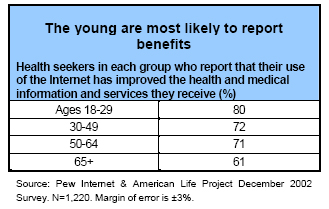Overall, 73% of health seekers say the Internet has improved the health and medical information and services they receive.
Overall, 73% of health seekers say the Internet has improved the health and medical information and services they receive. And when we asked in our online survey, “On the whole, have the online health resources you have used been helpful, harmful, or somewhere in between?” our respondents shared stories about how the Internet has been helpful.
While many cited the maxim “knowledge is power,” many more filled in a picture of the Internet adding a strong measure of psychological and emotional benefit to their health care management. One mother of an autistic child wrote, “It has given me hope for my son. I am not alone anymore.” Another respondent simply stated, “I am less afraid now.”
“I feel more in control of my own destiny and less at the mercy of someone who has many other people to take care of and who asks me when he comes in, ‘What are you here for?’”
One mother told how, when she suspected that her daughter had a serious respiratory infection called RSV, she looked it up online and took her to the emergency room. The doctor at the hospital sent them home with a recommendation to call a pediatrician if the girl’s condition did not improve within three days. But the mother was sure her online research was accurate and saw her pediatrician the next day. The girl did have RSV and stopped breathing at the doctor’s office. The mother wrote, “Her life was saved because I followed my instincts and I only followed my instincts because of what I read about RSV on babycenter.com.”
Respondents who wrote about the harmful effects of the Internet warned that people must watch out for “quacks” and misinformation, especially on discussion forums. One respondent found it “depressing” to read about other people’s problems. Another found the medical information online “too technical” to understand. Others warned that “moderation is key” and health seekers should vet any information they find online with a medical professional. “I’ve found both good and bad resources on the web,” wrote one respondent. “There are a lot of sites that are heavily sponsored by certain pharmaceutical companies and this definitely creates biases. Some sites are simply ill-informed and are passing on incorrect or out of date information.” Another e-patient wrote, “Some websites are very accurate with their medical information. Then there are some that are not. It takes a lot of research to figure out which ones are good, and which ones are selling snake oil.”

In our telephone survey, female health seekers are more likely than male health seekers to say the Internet has improved the health and medical information and services they receive (76% vs. 70%). Further, enthusiasm for the Internet among health seekers was inversely associated with age: The younger an online health seeker, the more likely she is to cite benefits from online information. There are no significant differences between health seekers with various levels of education and income. But it seems that health seekers enjoying high-speed Internet access at home are more likely than dial-up users to cite benefits – 81% vs. 71%.




